Bozeman to Mammoth
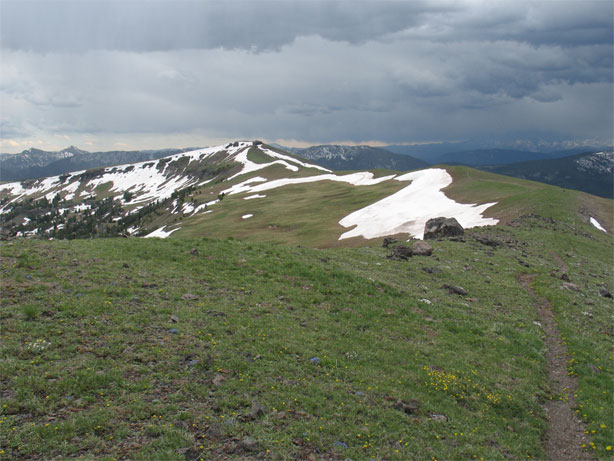
July 1, 2005
With my first words of the morning, in this new month and, hopefully, new start, I wished a happy birthday to a person far away. It was bitterly cold and my tarp had solid frost on it from front to foot, which ordinarily would keep me in my bag until the sun broke the mountains and brought its warmth to my bedroom. However, I needed to get an early start as the Devil's Backbone would be most likely covered in snow for some distance and I wanted to get the best conditions I could for as long as possible. The route was almost completely above treeline, which is not a good place to be when storms come in. Windy Pass was, it seemed, about twenty miles from here and I hoped to make it before the afternoon brought lightning with it. There was no time to lay about and think about the warmth of Las Vegas. I even put on my sun hat for a little extra warmth.
I crossed the snowy basin to the bottom of the ramp that I had spotted yesterday evening, postholing only moderately. The ramp was easy enough to negotiate, but the snow was quickly becoming rotten, despite the cold. The ramp gave out on a minor plateau below Hyalite Peak, with bits of trail popping out in the few uncovered patches of ground. The view back to where I had come from was spectacular in the pale light of the morning: The snowy basin, the green drop of Hyalite canyon, the brown plains stretching toward Bozeman.
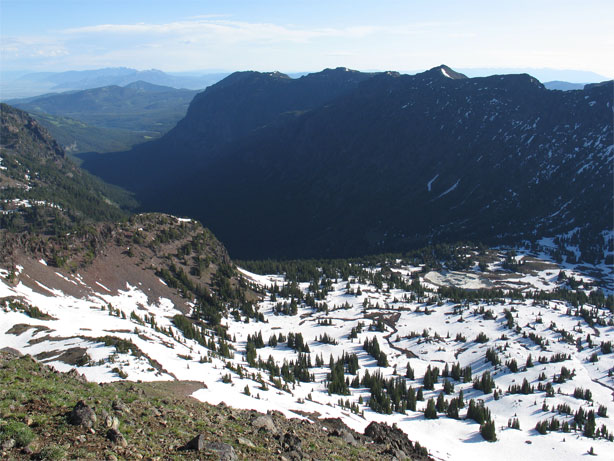
Standing on a bit of cleared trail, I was happy to find that I was in the right place, but the trail didn't mean much given all the snow in the direction it was heading. Instead of trying to follow switchbacks, I climbed the steep snow for a bit, then traversed around and through some snowy gullies to gain an easy heather-scree slope, which I walked up to the top of the peak, letting out a war-whoop as my friend Will always did when he topped out on a pass on the PCT. I thought the 75 minutes that it taken me were well spent, even though they would never come again.
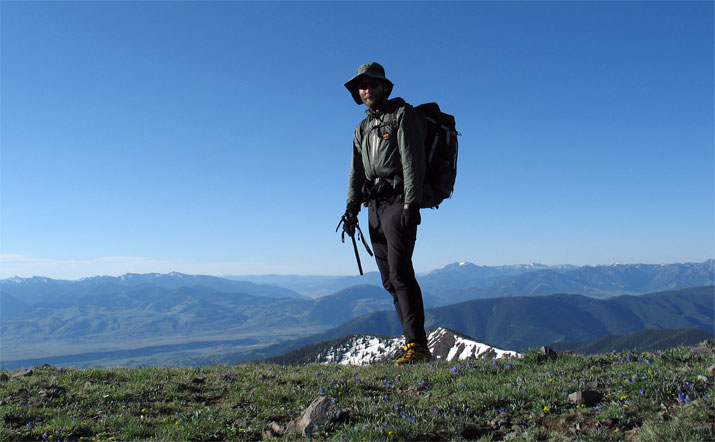
I signed into the register on the top of the peak and then had a sit to look at my immediate future. Stretching off in the distance I could see, quite easily, the route that I would have to follow for the next few miles: A long sequence of ridges, minor passes, small peaks, and broad ramps were leading south toward Yellowstone, and all of it seemed above treeline. And most of it had a nice coating of snow, right on top. Route finding was not going to be an issue as long as I stayed high, but travel was going to be difficult, it seemed.
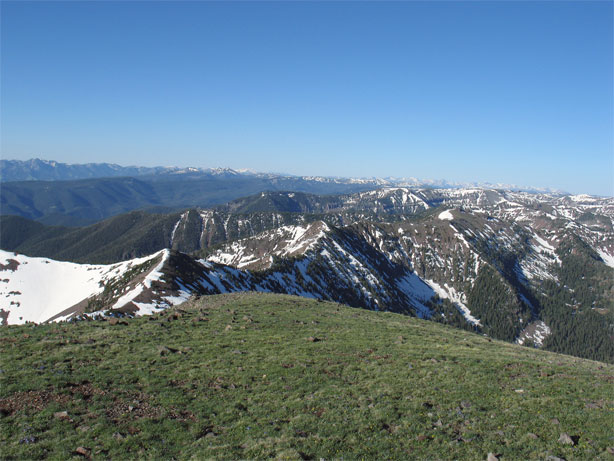
There was nothing to be done but to hike on, something I was happy to do. Life is good when what you want to do is the same as what you have to do. The sun was shining and the cold of the early morning had been banished. I just had to put in the physical effort, to put the work in, and I could enjoy a whole day in the alpine. I dropped down the other side of Hyalite Peak and picked up a faint foot path leading down to a pass, and then up onto the snowy ridge. The snow, much to my discontent, was concentrated, almost exclusively on top of the ridge. Off to the sides it was clear, but there were many places where it would not be prudent to end run the snow. I had to go through it.
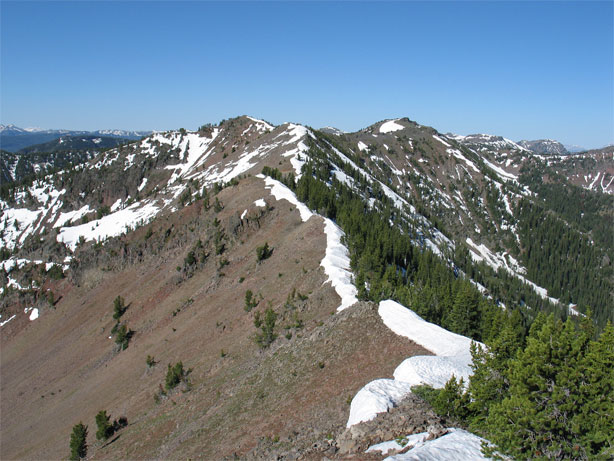
With almost every step I went in to my knees, sometimes not breaking through until I had almost stood up from the previous post hole. Other times I broke through immediately. Step after step after step, leaving a plowed trail through the deep snow, I was using everything I had in my body to keep my motion pointing forward. When I could end run the snow, by traversing along the scree just off of the ridge, I faced muddy, sloppy conditions caused by the melting snow. On flat ground, this is just an annoyance. On a 30 degree slope, it is a different matter. Sweat flowed without end. Eventually the ridge gave out and a post, apparently marking the trail, led down into a deep, filled basin, where the true path became unclear. On the ridge, it was easy to know where to go: Just don't fall off. In the basin, it was not so easy. A few rock cairns, sticking out from the snow, marked the path occasionally, but they were far apart at times and I had to spend time hunting around for the correct direction. It wasn't like I was in a nice, clear meadow in which one can simple roll around looking for the trail with ease. Every step took effort in the snow. With the post holes I was digging, I became exhausted and needed to get onto solid ground, where a step really was only a step. Having lost the trail completely, I plowed through the snow in the direction of a steep rock slope, only partly covered in snow, and headed straight up back toward the ridge. My guess turned out to be correct, as I cut the uncovered trail high on the face and took it back up to the ridge, exhausted.
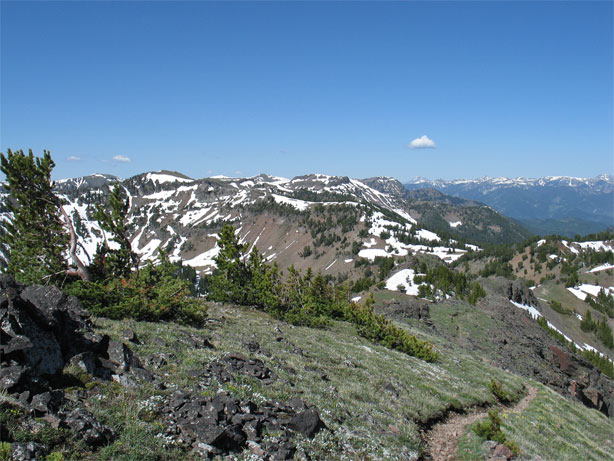
I sat down in the sun to rest. I wanted to rest and I needed to rest. After setting my tarp out to dry, I ate some lunch knowing that I needed the calories to continue on. I had been hiking for nearly six hours and had progressed, by my best estimate, only six miles from camp. Worse, I had used a large part of my daily allowance of energy to hike those miles, and still had, perhaps, fourteen miles to go to get to Windy Pass, and only a few hours to do so in before the daily storm. I thought about it again and decided that I was already running on my reserves. Grinding the seed-corn, if you will. Scanning the distance, it looked like the worst of the snow was over and the weather was still holding. I abbreviated my lunch break and headed out, not wanting to get zapped by something from Zeus this afternoon. While there was almost no trail at all, not much of one was needed up here.
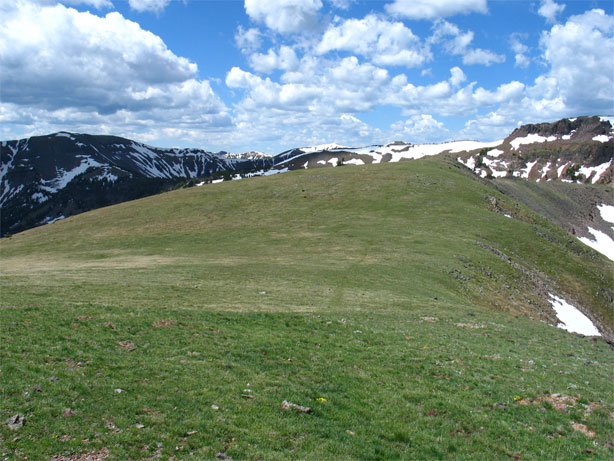
Walking along the snow-free ridges and plateaus was a joy, with no trees about to block the vistas and the views into the far distance. Occasionally I'd find bits of trail, or boot tracks, but the majority of the Devil's Backbone was a cross country route, despite what the Forest Service said. While snow still existed, most of it was off the crest, or could be walked around, and my pace picked up considerably. Still, the heavy pack on my back and the morning's exertion were taking their toll. Clouds began to build on the horizon and around two in the afternoon a storm was almost on top of me.
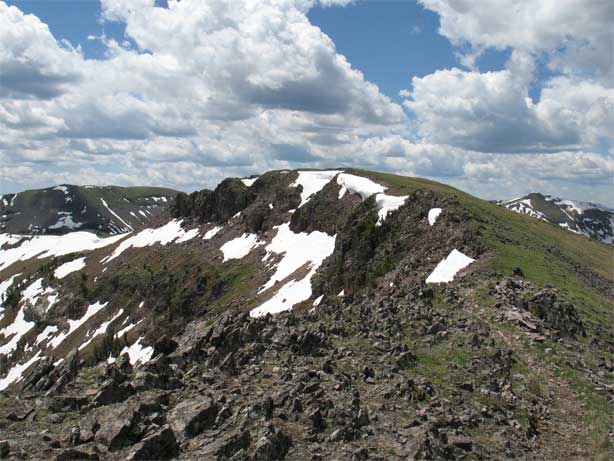
I hiked as quickly as I could, hoping to get across a long plateau before it struck me, but I couldn't move fast enough. The wind hit first, shoving me around. The hail came on top of it, pelting me and stinging my face, penetrating my beard with ease. The temperature dropped, which combined with the wind and my sweat soaked body, brought a deep chill to my bones. A Devil's tune was playing on my ice axe, as the gusts blew over the hollow spike.
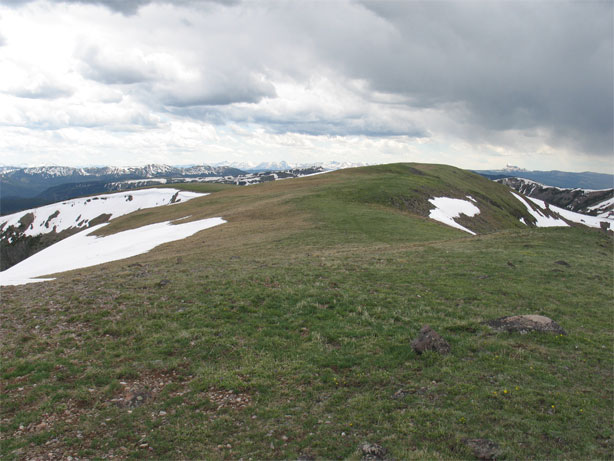
On the other side of the plateau the route dipped down slightly near some trees and I took shelter beneath several of them, mostly getting out of the hail storm and the rain that followed it. No lightning was in this storm, for which I was thankful. I had been huddling for thirty minutes, eating food for warmth, when the storm passed by and blue skies came out once more. Not a bad storm at all, I thought to myself. I hiked on happily, with my needs and wants in tune still.
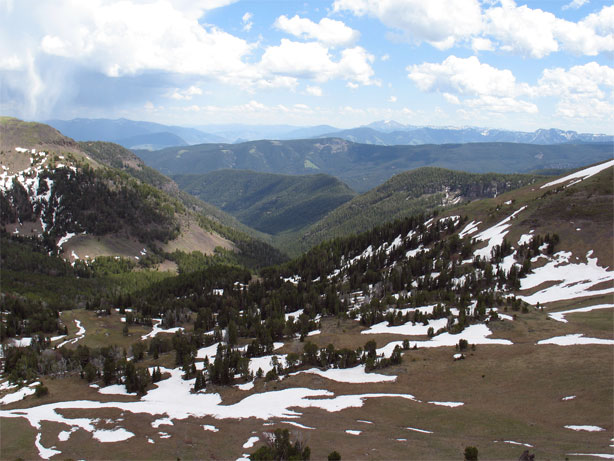
At times on ridges, other times traversing, the route wound around and around, through some of the most spectacular scenery I've ever experienced. Why this place wasn't over run with hikers and backpackers was beyond me. I had never heard of it until I started looking over maps, never seen it written up in magazines or in books. I tried to recall longer alpine ridge routes that I had been on, but could come up with very, very few examples. And nothing of this length. It was perfect. Until, sitting in a meadow drinking snow melt, I realized that I could no longer see my shadow. Looking behind me, I saw the grey clouds coming back for an encore. The storm was back. It looked bad this time.
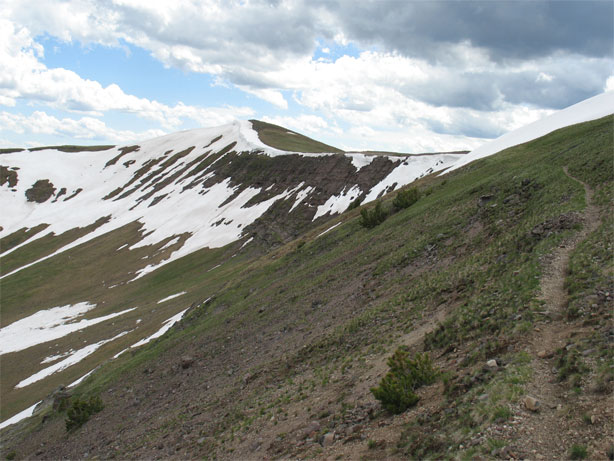
My tired body didn't have the power left to hike fast, even though that was what was called for. I could barely manage the normal three miles per hour, yet knew that I should be running. Watching your fate come to you, over the course of an hour, is an unsettling thing. If this storm held lightning, I could be in serious trouble: There was nowhere to run to and there didn't seem to be any dips or depressions along the way. I was the tallest thing around. I could feel the storm's power breaking over me as the wind began to pick up, slowly at first.
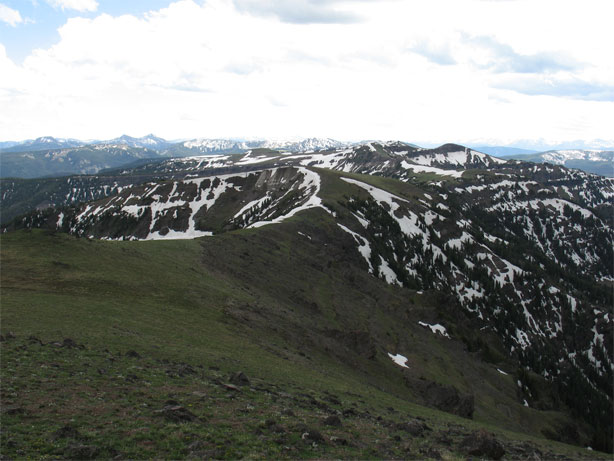
The wind increased, bringing with it hail. Higher winds, faster, bigger hail. Thunder began to roll, and I began to see lightning strikes. From rolling thunder to jolting boom, the thunder and lightning and wind and hail engulfed me in a tempest that made the storm in the Scapegoat seem coddling in comparison. With no trees or shrubs to break the storm, I was being tossed about like some proverbial ragdoll. Lightning began to strike the ridge I was on, just off to the side. A mile off, maybe, I thought. I was hoping for a mile. I didn't want to start counting in yards. I could barely look up to see where I was going, as the wind and hail were striking too hard for that. Head down, go, hope for the best. The Devil's Tune was my only companion. The threat of death by lightning was very real and I very much did not want to die out here on this track. Not now. I wished I was in Las Vegas, fat and complacent, ogling the waitresses and showgirls and eating too much at a buffet. I didn't want any more adventure. I wanted to be safe and secure and dull. I wanted my greatest problem to be whether to buy a mini van or an SUV. Lightning cracked in the valley next to me, bringing me back to the reality of a strike. And then I made a mistake.

I had rounded what I believed was the Fortress, a clump of rock near Windy Pass, which I thought would bring some measure of safety from the storm. Unfortunately, there was a massive, steep snow slide directly covering part of the traversing route. Ice axe in hand, indeed it had been in hand all day long, I began the climb up the 50 degree slope, aiming for some rocks on top, after which I traverse some rocks and then drop back down to the other side of the slide and regain the route. Simple, easy, not a problem. Distracted, I didn't kick a step deep enough about half way through the short climb. My foot hold collapsed when I stepped up on it and I found myself dangling from my ice axe, which I had at least managed to plant correctly. I wouldn't have slid far, I thought, looking down at the slope below me. However, I'd have hit the rocks with enough speed that I would have rolled down the mountain side for some distance. I didn't want to think of the consequences. Lightning struck close by, and I carefully righted myself, making sure to kick solid steps the rest of the way on the climb. On top, I spotted Windy Pass, which was not what I had expected.
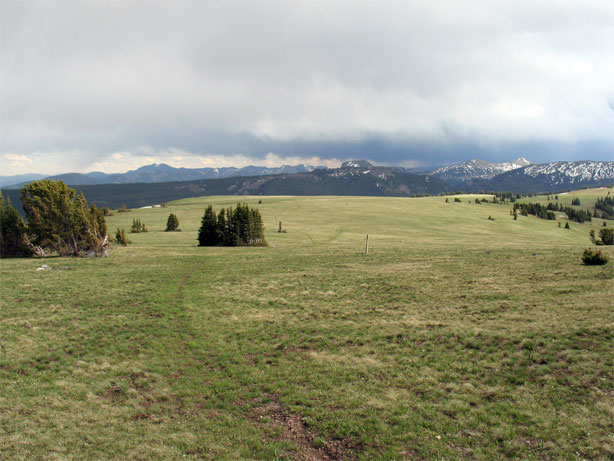
I had imagined a notch-like thing. What I got was really just a massive plateau, only slightly lower than the ridges around it. And stunning. The storm had ceased its fury after I recovered from my mistake and I had only high winds to deal with. No lightning, no hail, no rain. The route across was marked by posts and was thankfully flat, for I was on fumes at this point. Just enough strength to meander across. Nothing more. One benefit of the physical exhaustion was that my mind was starting to shut down as well as I went into Death March mode. I didn't have to think about the storm or the mistake, nor ponder if I had come through in tact due to pure luck, or if I had overblown the situation in my own mind. I didn't have to think about Las Vegas. I didn't have to do these things and I was grateful. I cut a trail and dropped down it toward the Windy Pass cabin, where I was planning to stay the night, if no ranger was on duty. I spotted horses just before reaching the cabin and so assumed that rangers were there. Surely they wouldn't mind if I cooked on their porch? However, when I reached the cabin I didn't see any of the normal signs warning that it was a federal crime to trespass. No, this seemed a different kind of cabin. I sat on the porch, pack still on, and rested. It was ten minutes before I got out of the harness. The owners of the horses soon returned. Patty and Lorraine were out for an overnighter at the cabin, which they said the Forest Service rented out. The storm faded and blue skies came out once again.
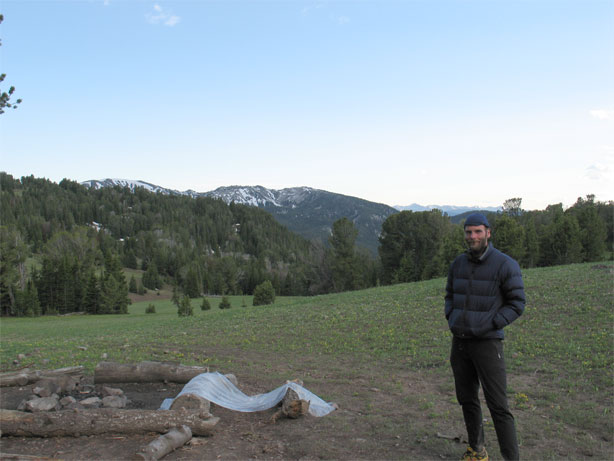
We talked extensively as I ate dinner and I was pleased to find out that Patty had been the backcountry ranger at Thorofare for almost ten years. The Thorofare ranger station is more than thirty miles from the closest road, of any kind, and holds the distinction as being the most remote outpost, outside of Alaska, of the federal government. I had told them something about the woes of my trip and the last few years of summer hiking, and that I was planning to retire after this summer. That I was done with this thing that I had loved so much in the past. I asked Patty why she retired from what is a coveted position in the Park Service. "Well, for many of the same reasons that you are retiring," she said. As time had passed, she had found herself drifting away from friends, family, loved ones. Being gone for six months out of the year, with almost no contact with the outside world, had taken its toll on her and her sphere of existence. She had never married and said, mournfully, that that was both good and bad. She had a lot of freedom in her life now, but also had missed her window of opportunity for other things. Those were things, and times, that could never come back. She looked at me as she spoke, and I felt that words were not necessary. Her eyes communicated everything to me. I hadn't told her any of the real reasons in my heart, but I didn't need to. She knew them. Yes, I was retiring.
I went off, ostensibly, in search of a place to pitch my tarp, but really to think about what Patty had told me and what I should do when I got to Jackson. Patty was right, I thought. I had been growing away from people, despite having made very close friends during the previous summers. Friends that had no barriers, no reservations. People with whom I shared a bond of closeness that I had never experienced before. Those, however, were friends I had little contact with besides emails and phone calls once we had returned to the world of the Normal. They lived spread across the country, in other countries, far from me and I from them. Places like Racine and Moab and Vancouver and Canmore and New Orleans and Los Angeles. Friends that I normally saw for only a few days a year. For eight months of the year I lived thinking about how to live in the three months of the summer, and the one month of winter vacation. I had never, to use an expression of someone once close to me, put down roots. I had gained an extended, separated trail family, almost a tribe of permanently misplaced wanderers, and had seen much of the best of America, but I had not established myself in a community. Looking back to what I had left in Lakewood, I realized that I had, still, only my stuff and my job to go back to when the summer was over. I had hoped that this summer might be different, that I might be able to come back to something more. But the afternoon before I left I found out that this was not possible, that it could not happen. And that loss was still tearing at me.
I set up my tarp, actually feeling better, and said good night to Patty and Lorraine. I was so very glad to have met them out here. Patty had given me some insight, through her own experience, into my own problems and situation. I could not have done this on my own and I went to sleep pondering what to do with the summer. Not only what I wanted to do, but what I needed to do.
Lorraine and Patty were still quite asleep in the cabin when I walked past, heading back up to the Devil's Backbone. I had little energy after the exhausting day before and I had much on my mind to ponder. I was passing through, perhaps, the most beautiful land in America and didn't really seem to care any more. I slogged along the divide, thinking instead about my life at home. Not, however, as in the past. Rather, in the new light that Patty had cast on it.
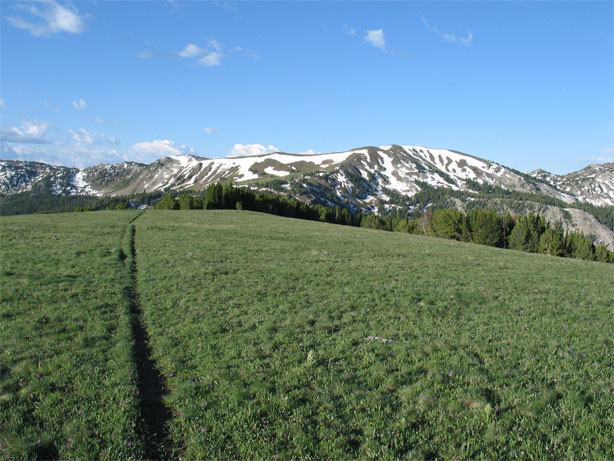
There was a poverty to my life during most of the year that disturbed me. I had not seen it or, more accurately, refused to see it, until that poverty was relieved during the Spring. When the Door was opened for me, I still did not see it because the poverty had vanished. However, when the door closed in June, and the poverty was stark and apparent, I could not help but see it. When everything fell apart, or rather came out into the open, I realized, not yet fully, what I had lost. That loss was breaking me into pieces because I was not really dealing with it out here. I didn't have the strength to deal with both the rigors of the Trail and to understand. I was doing both in a half-assed way, and that wasn't working.
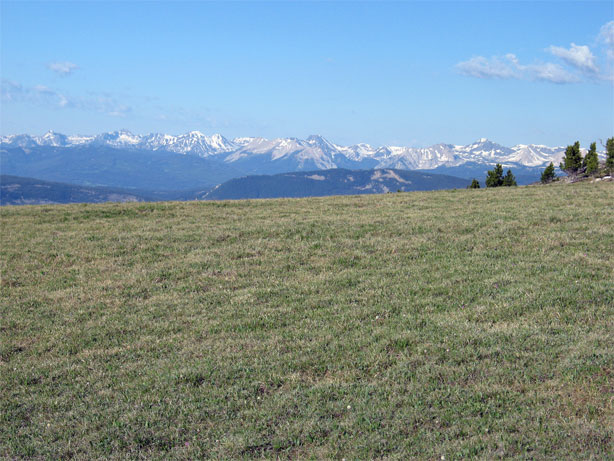
I was unhappy out here not because I had gotten a shock one afternoon, but rather because I was seeing my life in a new light and did not like what I saw. I had to stop the trend of drifting away, of isolation. I had not seen how far it had gotten until that afternoon, and had not begun to understand it until last night, when I spoke with Patty. And so I questioned why I was out here, why I was heading for Jackson, why I was hiking through some of the most remote land in America when what I needed to do was to go home and reverse the trend. To get some final closure with my Catalyst, or to open a new door with her if things had changed.
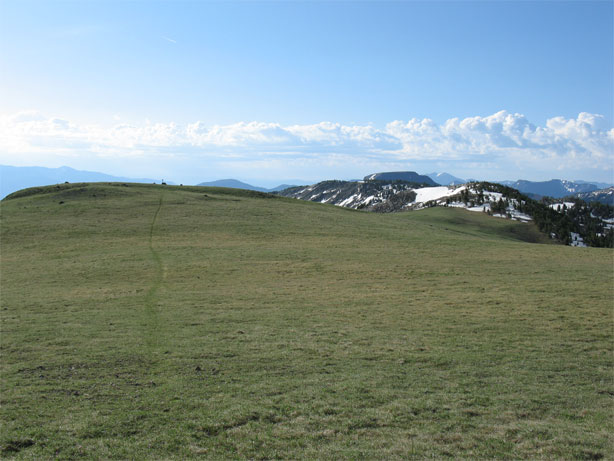
The immaculate, unbelievable land passed by me and I did not care at all. I could have been walking through the streets of Boston or along the lanes of some superhighway for all the notice I took of my surroundings. Why was I hiking on? I had, at least, to get to a road, to a bus stop. Jackson seemed the closest place. What was keeping me out here? It was simple pride. I didn't want to look soft to people that knew what I was doing. I didn't want to exit the trail and have to try to explain why I did so, when I had planned on walking to Mexico.
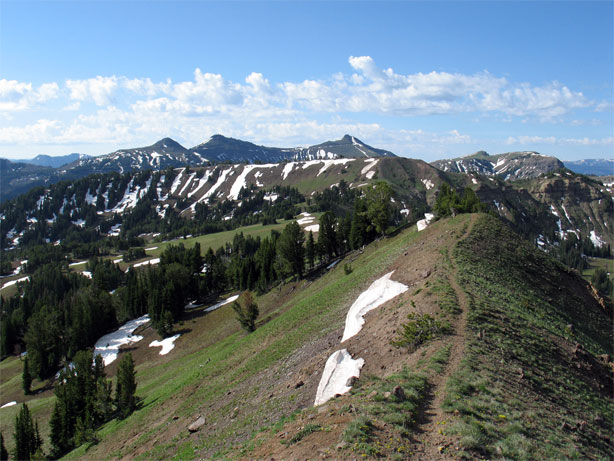
Moreover, I didn't have a simple explanation to give to anyone. I was doing fine physically. I had plenty of money saved up. There was no crisis at home that I could do anything about. Skywalker had left the trail in East Glacier because his best friend was in a coma after a car accident. That was a reason everyone could understand. How could I explain my exit?
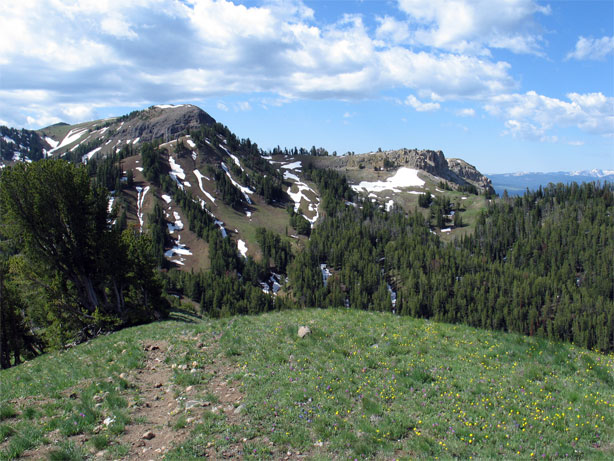
I found myself sweating hard after climbing up from a minor dip in the trail and gazed out onto the horizon to find that the Devil's Backbone was over. There was no more ridge to run. Somewhere out there was Highway 191, running south to the town of West Yellowstone. Patty and Lorraine had assured me that it was an easy hitch on the road, if I wanted to go into West Yellowstone and get a permit or a bed for the night. As I dropped down the dusty trail, I found myself wondering if West Yellowstone had a Greyhound station.
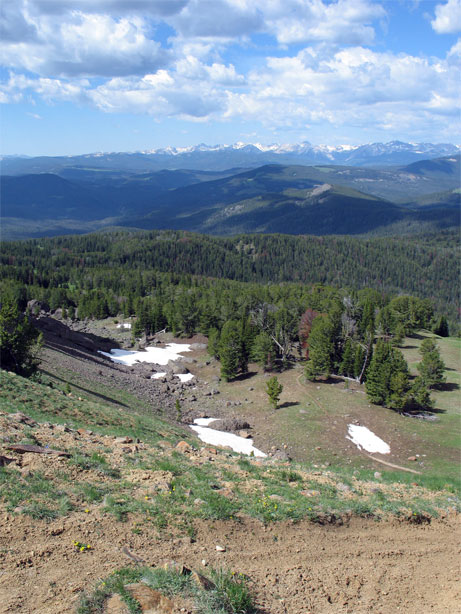
I had planned to take a sequence of passes over and into Yellowstone, but an hour after leaving the ridgecrest I found that clouds had come in and the weather was threatening. Memories of yesterday's storm and my still undecided mind led me to take a lower, shorter route out to 191, but one that requried, if I was still hiking on, a longer hitch or road walk to get to my intended trail into Yellowstone and the Mammoth complex.
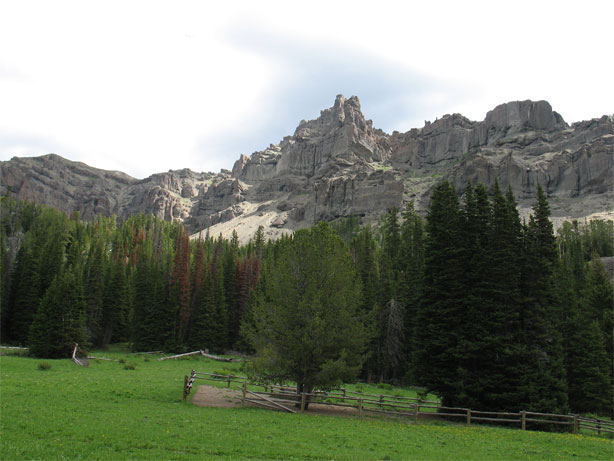
I was happy to be down low as storm clouds passed overhead and I heard the boom of thunder, saw the flash of lightning. Rain came down, though gently. Feeling happy at having escaped some physical misery, I began to feel better about hiking in general. I was going to continue on. Why was unclear and it was too easy to just blame pride. Perhaps it was hope, instead.
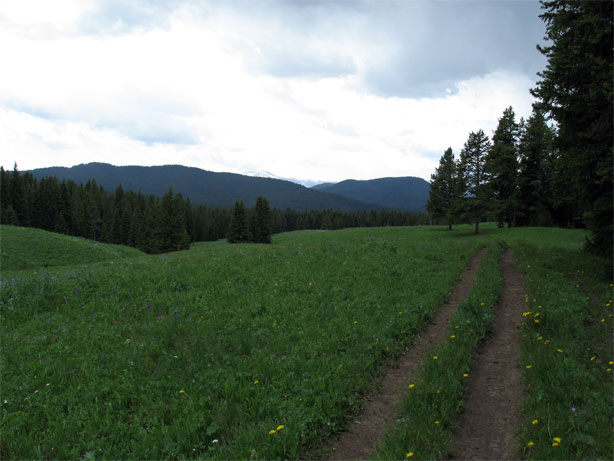
The track quickly degenerated into a mudway that rivaled those of the Bob Marshall. This was the land of many uses, which meant that trail bikes could be taken up and down it, along with horses. Indeed, a motorbike ridden by a man and his boy came by me as I hiked through the rain. When the rain fell harder, I took breaks under trees. When it was less, I walked through it. Slowly I reached the trailhead access road and walked along it, passing through a resort ranch, and out to Highway 191. I found a good place to hitch from and stuck out my thumb. The rain began to fall more, and I spent two hours in a direct downpour, or merely being spit on, without much of a look from anyone. No one, as usual, was going to pick me up. Thoroughly miserable, if someone had offered me a ride, I'd have gone all the way to West Yellowstone and then home, somehow. But, no one was stopping. I walked along the narrow shoulder road, bored with standing in the rain and feeling sorry for myself. I had been doing that too much this summer. As I walked, the sun began to come out and, after an hour, it was positively pleasant out. I stopped for dinner under a bridge over the Gallatin River, feeling rather pleased with myself. This wasn't hiking. Rather it was hoboing, and the change was a good one.
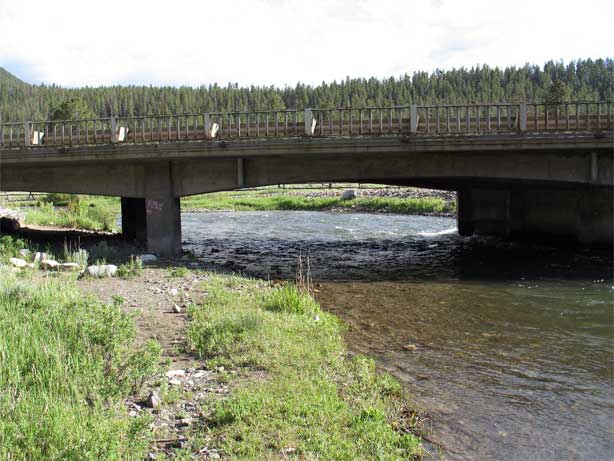
I stayed by the bridge, in the sun, for an hour before setting out back down the road. Cars passed in both directions, but I no longer resented their not stopping. I was actually happy on the road. I didn't feel sorry for myself. This was a rare moment. I walked through the gates proclaiming the boundary of Yellowstone National Park and began wondering where I might sleep tonight. Officially I had to be in a front country site, or have a permit for a specific backcountry site. I was was no where near the one, and didn't have the other. When I reached the Black Butte trailhead I spent a bit of time searching for a stealth site out of sight of the road and eventually found a reasonably hidden site. As I snuggled into my sleeping bag, I wondered what all the people in the cars were doing right now. Where were they all headed to? Perhaps they were watching television. Perhaps they were with loved ones. I hoped they were happy, I needed them to be happy. They had been driving to get somewhere and I wanted them to have found what they were looking for. I suspected that many of them were secretly unhappy, but I'm an optimist and wanted to believe. I thought about Las Vegas. I was no longer so happy.
The cold of the morning wasn't enough to keep me from leaping out of my sleeping bag after dreaming sweetly overnight. Because of the mountains to my left, I walked down the deserted highway in the cold shadows for an hour before the sun finally broke through and brought some measure of warmth to my flesh. I was heading for the Fawn Pass trailhead, a few hours down the road. While lower, and certainly less scenic than the pass I had originally intended to take, it was sure to be snow free at this time of year. I'd get to the same place, the Mammoth Hot Springs complex in Yellowstone National Park. A state trooper pulled alongside me and engaged me in a friendly chat, asking all the standard questions that an officer of the law would ask someone seen strolling down the road, obviously homeless. I had hoped he might offer me a lift to the trailhead, and so arrive in style, but there were probably rules against such things.
At the trailhead I found a notice telling me that there was a bear closure for a stretch of the trail on the other side of Fawn Pass, but this didn't worry me much as I wasn't planning on camping there anyways. With actual pleasure I leapt onto the trail and begin hiking through the open, rolling meadows that I had heard characterize much of the park. Yellowstone is not known as a scenic, mountainous destination. Hikers and climbers tend to shun it in favor of places like Grand Teton and the Wind Rivers, places where there are large expanses of alpine terrain. I found the scenery to be exactly what I needed, what I liked, and hiked with a smile for once.
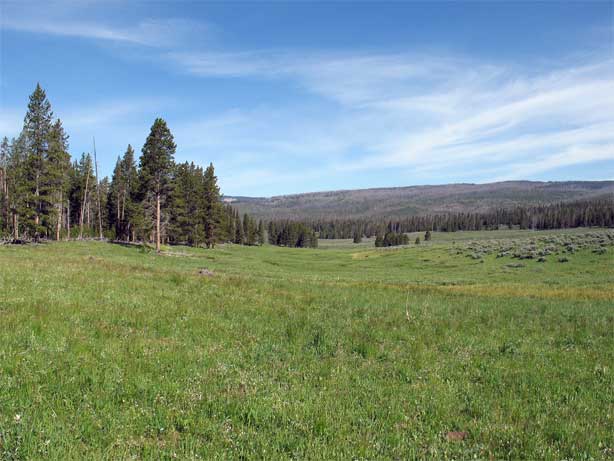
I stopped for a break in a clump of burned out trees and removed my rain jacket, which I had needed for warmth in the early morning cold. It was pleasantly warm now and I almost took a nap there, with the dead trees, for I had an idle feeling this morning and the landscape seemed to strengthen it. I wanted to make Mammoth, however, today and so declined a 9 am nap. The walk up to the pass was gentle and mostly open, with only a few stands of trees getting in the way. Big, broad, and rolling, Fawn Pass was like the monster passes in the northern Canadian Rockies, rather than knife-edge affairs that I was used to from the Pacific Crest Trail and hiking in Washington. One could live on Fawn Pass quite nicely, tucked away at 9100 feet. At least until the winter came.
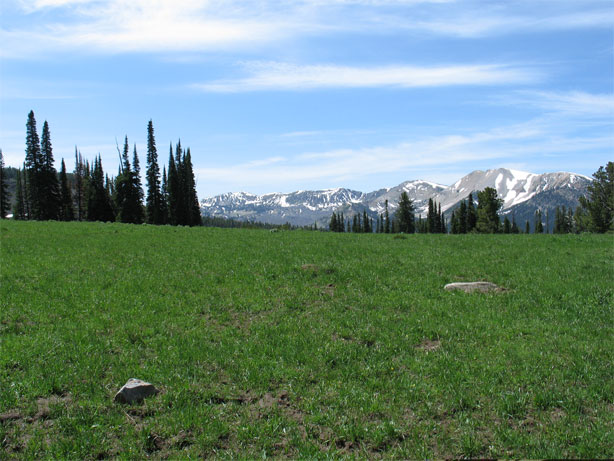
Contrary to my expectations, there was plenty of mountain scenery to gawk at as I traversed the pass area. A large snowy range thrust up in front of me, but I was happier here than I would have been there.
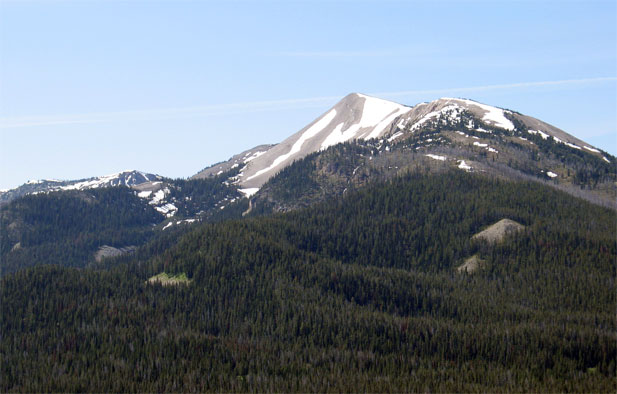
I sprawled out in the middle of a large meadow to rest again, not that I especially needed it right then. Rather, I simply wanted to enjoy some sunshine and the mountain air, the sounds of the birds and the wind, I wanted to keep this feeling inside of me for a while longer. I wanted it burned into me, for I had had precious few days like this in the recent past.
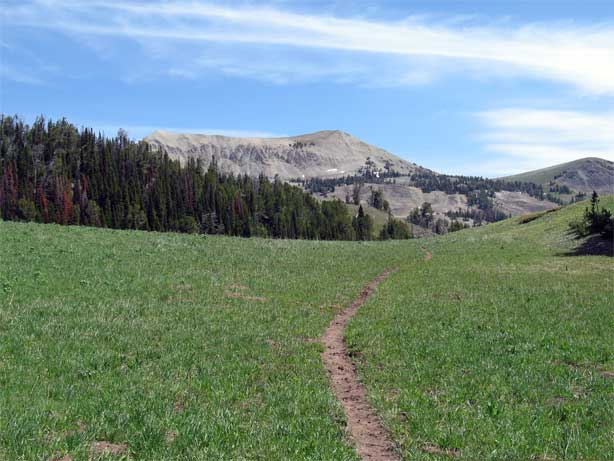
I found a can of bear spray sitting by the side of the trail and pocketed it, hoping to meet the previous owner on the way down. Even if I didn't, it wasn't a bad idea to have it with me, being that I was in one of Mr. Griz's strongholds. The trail dropped down the other side of the pass and began to follow Fawn Creek for a long stretch. Walking was so pleasant, or maybe I was feeling so pleasant, that I almost forget that I needed to eat lunch and dry my tarp from last night's condensation. I found a patch of flowers in the shade of a tree and plopped down inside; I wanted a perfumed lunchroom for my hour's lounging.
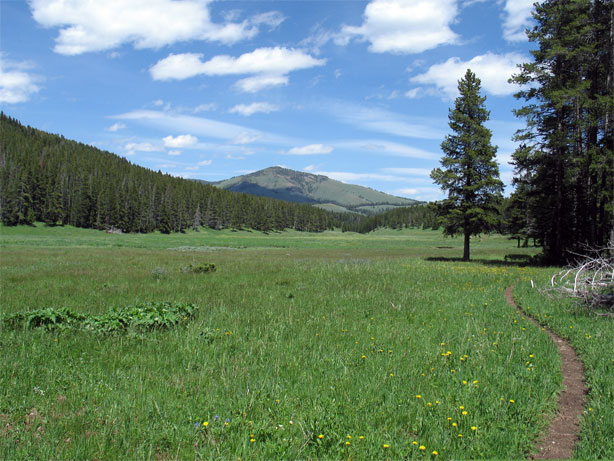
Reluctantly, I got up from my lunchroom and repacked my gear, setting out with the intention of hiking for a good long stretch. The land was practically flat and walking on flat land costs me almost no energy. Without the mental burdens of other days, time slipped by almost without notice. The land was becoming dried and drier and I began to encounter one of my favorite plants: Sagebrush. I was in Gardiner's Hole, according to my map, which I had pulled out as I rested by the banks of a river. Everywhere the eye could be pointed there was nothing but flat, open sagelands. The scent of that plant reminded me of all the good times from 2003 and was omnipresent until I reached central Oregon.
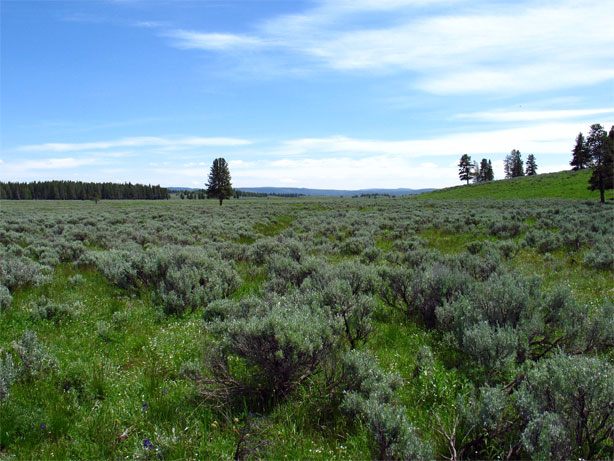
Looking back from where I had come I could see that I had really been in Gardiner's Hole for sometime: The mountains that I had passed by a few hours before were the western limit of this hole, which is oldspeak for a big plateau hemmed in by mountains.
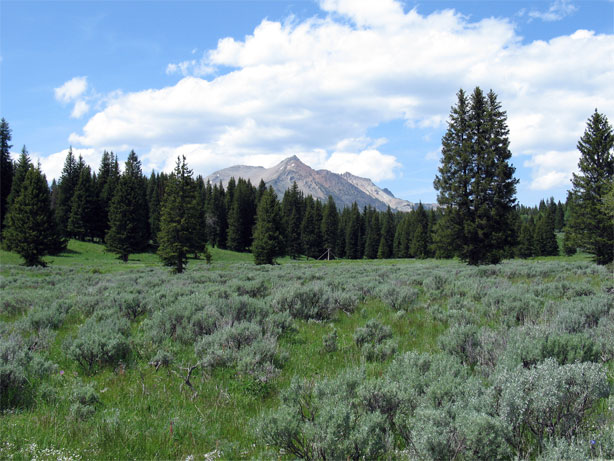
I figured that I was an hour from Mammoth and I could make that easily in one stretch of hiking. As the trail led up and around some minor hills, I realized that there was no way I could make Mammoth with out at least one rest break: As I crested out on a hill, the entire enormous plateau holding Mammoth spread out before me in a vista that broke forth a vocal exclamation from somewhere inside of me. The scent of the sage and the power of the land, it's very openness giving it a strength that we used to call Nobility. I took a picture, knowing I couldn't use photons to communicate such a spectacle, then sat next to a rock and gazed. Far below I could see one of the highways through the park and the microscopic vehicles moving along it. For the first time since I left Bozeman, indeed perhaps the only time since I left home, I didn't want to be anywhere other than here. This was perfection, indeed. If a magic carpet had shown up and offered me an instantaneous lift to somewhere, like Las Vegas, I would not have gone. I would not have traded this moment for anything.
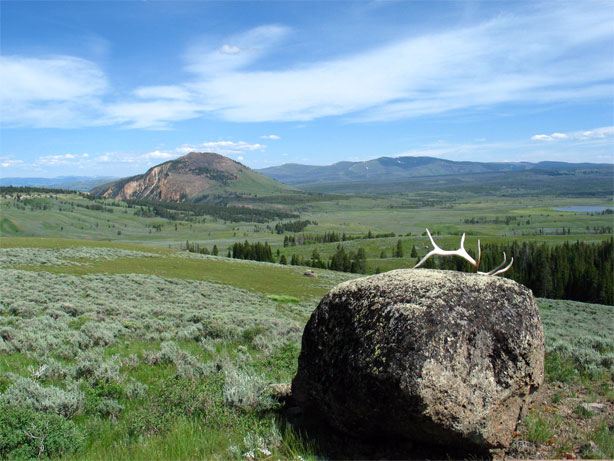
I sat by the rock for thirty minutes and then, fully saturated, began what I thought would be a short walk to Mammoth. My short walk turned into a three hour trek, complete with missing signs at trail junctions that didn't exist on my map, and swarms of mosquitoes. Hot up and down hiking, rolling through junk lands, was not the way to come down from my perch next to the rock. I had thought that I was only two miles from Mammoth when I left the rock, but it was more like five. Frustrated, stung, and sweaty, I almost stepped on a very large snake that was stretched on lengthwise on the trail in front of me. It didn't even twitch. Examining it, I declared it to be a Bull snake, given that it looked like a rattler, but without the rattles. I carefully walked around it on the upside of a hill, then stormed down to the front country.
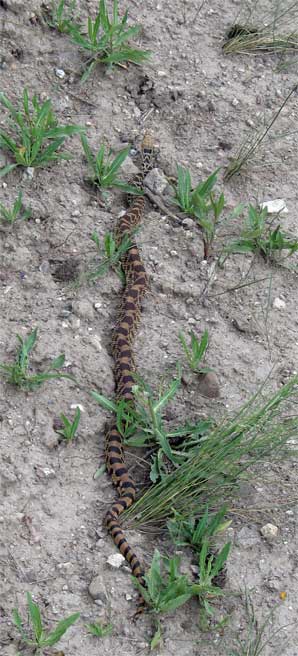
I could hear them for fifteen minutes before I could see them. I could smell them for five minutes before I saw the first. The sound and smell of tourists, after you've been in the woods for a while, is unmistakable. The hum of electricity and the clatter of diesel engines broke the softness of the forest, and the perfume of their freshly laundered clothes, their well scrubbed bodies, obliterated the sage. Indeed, my own funk was driven from my nostrils and replaced with that artificial, spring-breeze scent. A row of cars was spotted and then I saw the people themselves. Walking along on a catwalk in the hot springs area were families and individuals gawking at the natural formations. They were taking in one of the finest sights on their (and my) land and I could not fault them for doing so. I just wasn't especially happy with all the machines and the crowds after the last few days.
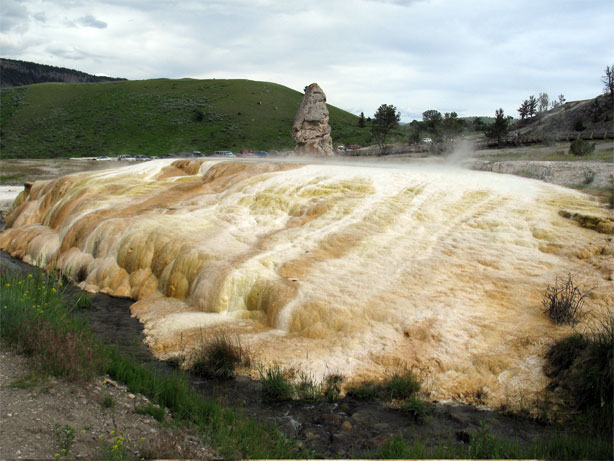
On my map Mammoth was marked with the symbols for a campground and a ranger station. What I found was a veritable town. As I began walking into town, the throngs of tourists brought about a feeling of bitterness inside of me. The waves of people parted for me as I stalked down the sidewalk, passing the public bathroom complex (complete with lengthy lines), the gas station, and finally the general store. I dropped my pack and went inside to buy some supplies for the night, a few treats, and a soda, for I was very thirsty. Conscious of my smell and appearance, I went outside quickly and sat next to my pack by the side of the store, drinking my soda and looking at the people as they passed by. Perhaps it was the scowling look of disapproval (at what?) on my face, or my beat appearance, but every one who turned to look at me seemed frightened. Maybe they thought I would leap out at them like some tiger and steal their wallets or hack them into pieces with my 5 oz. carbon fiber ice axe. "I teach your children," I wanted to say. I wanted to yell to them, "I have a doctorate in mathematics!" Instead, I drank my soda quickly and ran off to the campground with my treats, wanting to get out of the public eye for a bit. I really had no quarrel with the tourists and thought it wonderful that people still brought their families to one of the jewels of the American public lands system. I just thought things could be done in a better way.
Passing the massive restaurant complex, then the huge hotel, the courthouse (complete with jail, no doubt), the visitors center, and finally the post office, I plodded down hill, trying not to get hit by cars, and found the check-in counter for the campground. For $5, I got the best room in the place and was directed by a helpful old man to my bedchambers. I pitched my tarp as I swilled beer and then sat down against a tree to think. The picnic table would have been more standard, but I was more comfortable next to the tree, using it for a bit of back support and stretching my legs out, a bit shocked at the blackness of my toes. I wondered what she was doing right now, and why she had shown up at my door in the first place. I didn't know the answers to either question, but I did know that, right now, neither answer mattered very much. This was easily the best day of the entire trip and I just wanted things to continue as they had.
Following dinner a cyclist showed up, but we only spoke briefly. From Britain, he had been traveling around the world for the past year and had only a few weeks left before his Around-the-World ticket expired. He was weary, as he should have been, from the travel. He had cycled through much of China and Southeast Asia before moving on to Fiji and now the United States. He had ridden from San Francisco up to Anchorage, and was now out seeing his last bit of the States before returning home to London to begin life as a student of geography.
I went to sleep as it became dark out and hoped for sweet dreams once again. If tomorrow was like today, perhaps it would snowball into something good. I could salvage the summer and become something stronger than what I had previously been. I could achieve those things that I had set out looking for several years ago. I said goodnight to the Universe in general and closed my eyes, wishing I could seal in the feeling and reserve it for the morning.


































